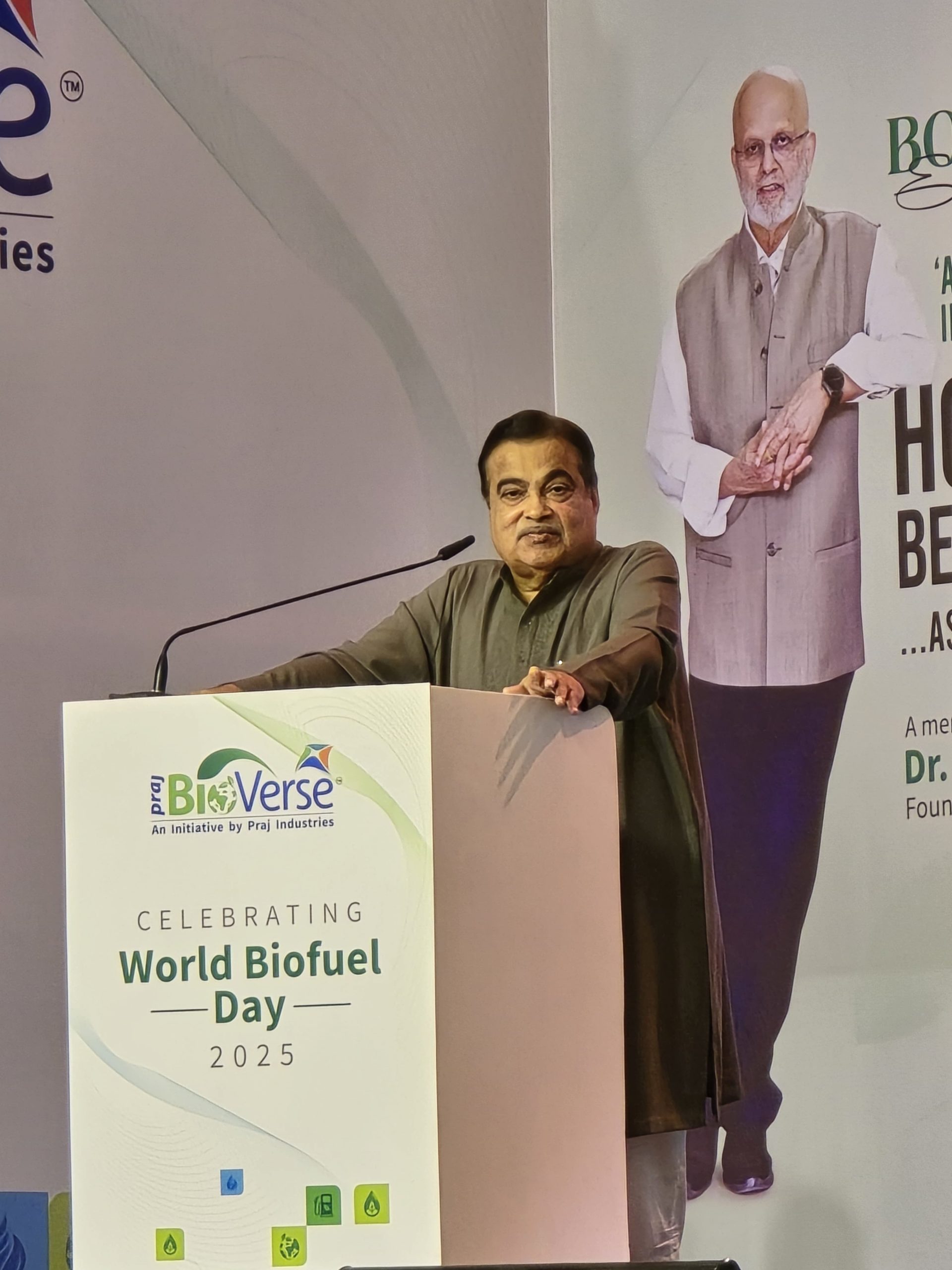Union Minister for Road Transport and Highways Nitin Gadkari marked a decade of India’s commitment to sustainable energy at the 10th anniversary celebration of World Biofuel Day, held in Pune. The event, hosted by Praj Industries, brought together industry leaders, policymakers, and innovators under the newly launched ‘Praj BioVerse’, an initiative symbolizing India’s growing leadership in the global bioeconomy.
Speaking at the event, Gadkari urged Indian industry to accelerate the transition to biofuels, highlighting the multiple benefits: reducing crude oil imports, boosting rural incomes, cutting emissions, and transforming agriculture. “Our farmers will not just grow food, but also fuel for aviation, construction equipment, and vehicles. The day we stop importing fossil fuels will mark a historic transformation,” he stated. He also highlighted that ethanol boost has helped the corn farmers to earn better price for their produce.
As part of the celebrations, Praj Industries officially launched ‘Praj BioVerse’, a forward-looking initiative aimed at uniting innovation, collaboration, and sustainability under one integrated bioeconomy ecosystem. The launch took place in the presence of Union Minister Nitin Gadkari, Sanjay Kirloskar (President, MCCIA & CMD, Kirloskar Brothers), and Vikram Gulati (Country Head & Executive VP, Toyota Kirloskar Motor).
To celebrate the milestone, Praj also unveiled the memoir of its Founder-Chairman, Dr. Pramod Chaudhari, titled ‘Horizons Beyond Dreams … As Is What Is’, reflecting decades of pioneering work in green energy, circular economy, and rural-centric innovation.
Speaking to industry leaders, Gadkari framed biofuels as a strategic imperative for India’s energy security and rural economy.
Union Minister Nitin Gadkari emphasized the pivotal role of the automobile industry in India’s economic growth, noting that the country has now overtaken Japan to become the third-largest automobile market in the world. He highlighted that the auto sector is also the significant contributor to the GST, underlining its economic significance.
However, he also pointed out that 40% of the country’s air pollution stems from automobile emissions, making it imperative to adopt cost-effective, import-substituting policies focused on alternative fuels. Such a shift, he stressed, is crucial not only for protecting the environment but also for ensuring energy security and economic stability.
Minister Gadkari reiterated that the move towards biofuels is also a key strategy for rural employment generation. “Agriculture must become more economically viable, we need to increase the agricultural GDP significantly,” he said.
He shared insights into the government’s efforts to diversify agricultural output toward fuel production. Initially, the idea of producing ethanol from maize faced criticism due to the ‘food vs fuel’ debate. However, he noted that ethanol production has positively impacted the sector, corn MSP has risen, and corn acreage has increased significantly as a result.
He said that the MSP of corn was Rs 1,800 per quintal and the market price was Rs 1,200 per quintal. However, since ethanol was introduced, the price of corn in Bihar and Uttar Pradesh has risen to Rs 2,600–2,800 per quintal. Because of ethanol, corn farmers are now getting better prices.
Ethanol has also helped resolve longstanding issues in the sugarcane industry, particularly delays in cane payment to farmers. “My life’s mission has been to prevent farmer suicides, and that is why I have dedicated my efforts to transforming agriculture through innovation and value addition,” Gadkari further added.
Highlighting the future of sustainable energy, Union Minister Nitin Gadkari stated that IsoButanol is emerging as an an alternative to traditional diesel. He also emphasized ongoing efforts to develop and scale biodiesel, which offers a cleaner substitute for diesel engines.
In a major win for environmental protection, he noted that the burning of rice straw has significantly reduced, thanks to its use in biofuel production, a move that has helped combat air pollution in several regions.
Gadkari stressed the importance of “converting knowledge into wealth” as the driving force behind India’s green industrial future. He also pointed out innovative infrastructure initiatives, mentioning that municipal waste is now being utilized to construct highways in multiple cities, turning urban waste into national assets.
shared an ambitious vision for India’s energy and automotive future, underscoring the transformational role of sustainable technologies.
He stated that burning of rice straw has significantly reduced, thanks to alternative uses like biofuel production, and emphasized that “conversion of knowledge into wealth” is the path forward for India. Highlighting innovation in infrastructure, he added that municipal waste is being used to build highways across several cities, demonstrating the power of circular economy models.
Gadkari also revealed that he recently met with the Chairman of Mercedes-Benz and announced that India will soon export Mercedes EVs, marking a significant step in India’s emergence as a global electric vehicle hub. “With the kind of research and innovation we’re undertaking, I’m confident India will become the number one automobile manufacturing country,” he said.
He further emphasized that India is on track to become an energy-exporting nation, driven by biofuels, green hydrogen, and other alternative energy sources.
Calling for greater focus on bamboo cultivation, Gadkari urged Praj Industries to explore its potential in bioenergy applications. He also highlighted green hydrogen as the fuel of the future, requesting Praj to play a leading role in this transformative sector.
Touching on flex-fuel technology, he noted, “I’ve been using a Toyota flex-fuel vehicle for a year, it’s both fuel-efficient and environmentally friendly.” He expressed confidence that construction equipment will also transition to FFVs (Flex-Fuel Vehicles) in the near future.
Looking ahead, Gadkari envisioned a future where green energy revenues empower India’s rural landscape. “Our farmers will not just grow food, but also fuel for the aviation sector, construction machinery, and more. The day we no longer import fossil fuels, we’ll know we’ve achieved something truly historic.”
Dr. Pramod Chaudhari addressing the event said, ” I am delighted to launch Praj BioVerse, a unique movement that brings together innovation, collaboration, and sustainability in one powerful ecosystem. BioVerse is where ideas are transformed into solutions, where climate action walks hand-in-hand with economic growth, and where India’s leadership in the global bioeconomy takes centre stage. This is perfectly aligned with the vision of Viksit Bharat — fostering inclusive growth and building a circular bioeconomy. In today’s changing geopolitical and trade environment, energy security is no longer optional. it is a strategic imperative. Our bioeconomy model, rooted in local systems and rural self-reliance, is both sustainable and scalable for nations across the world. Walking through the BioVerse experience today is like witnessing the entire Indian bioeconomy value chain in action, from feedstock diversification and intercropping practices, to advanced co-product innovations ensuring farmer profitability and steady supply chains. We saw Kirloskar Oil Engines test a B50 blend for the first time in India. We saw the Automotive Association of India pushing forward ethanol–diesel blends and fast-tracking certifications for biofuel technologies that meet the highest standards of performance, safety, and sustainability. From ethanol-powered bikes to next-gen engines, today’s exhibits show that technology and industry are ready to scale. But this transformation requires more than technology, it demands collective action. Innovators, researchers, manufacturers, and policymakers must come together as one.”
“Today’s launch is not an endpoint. It is the beginning of BioVerse becoming the platform where the global bioeconomy community gathers year after year to collaborate, to celebrate, and to accelerate the circular bioeconomy. My journey in this space spans decades of challenges and breakthroughs. After the release of the Marathi edition of my book, I was humbled by the demand for an English edition from colleagues and partners around the world. This edition is my way of sharing my experiences and inspiring the next generation to embrace entrepreneurship through innovation, fairness, and trust. I firmly believe that world-class research, innovation, and leadership can and must be achieved right here in India,” he further added.
Vikram Kasbekar – CEO, Hero MotoCorp said, “We were among the first in the country to develop a flex-fuel two-wheeler capable of operating on blends starting from E20. Since 2023, our entire portfolio has been E20-compliant. This is not just about technology — it’s about supporting the circular economy, benefiting farmers, and reducing our dependence on imported fuels. We have upgraded our technology so that modern ethanol-compatible engines deliver fuel efficiency comparable to traditional petrol engines. These vehicles are being well-accepted in the market and are running successfully.”
He further stated that just like we, as human beings, go for preventive health checks, improve our lifestyles, and take care of our wellbeing, vehicles too require timely preventive maintenance. Regular performance checks, pollution tests, and proper documentation and fitness certification will go a long way in keeping them safe, efficient, and environmentally friendly — especially as they age. I can confidently say that our vehicles in the field are fully E20-compliant, and I do not foresee any significant challenges in this transition.
Vikram Gulati – Country Head & Executive Vice President, Toyota Kirloskar Motor emphasized that today, most automotive companies — two-wheeler and four-wheeler alike — have introduced flex-fuel vehicles capable of operating on ethanol blends from E20 to E100. Yes, there are still some barriers, but we are overcoming them with strong policy support from the Government — whether through enabling CAFE norms and taxation structures for OEMs, or by creating the right environment for customers and the supply chain to adopt these fuels.
He said, “I would like to make one specific point, not just as an automotive professional but as an Indian: as we move forward, we must scientifically and globally recognise ethanol as a carbon-neutral fuel. This recognition must cross borders. In the coming years, economies will increasingly be driven by carbon trading. India has a huge opportunity — not only to use ethanol domestically and save billions in foreign exchange, but also to earn substantial carbon credits on the global stage.”
Sanjay Kirloskar – President, MCCIA & CMD, Kirloskar Brothers Ltd elaborated on Prime Minister’s vision for 2047 and said, “If we are to reach the Prime Minister’s vision for 2047, India will require around 1,000 GW of generation capacity. Fossil fuels will have to be phased out, and we will need base-load power — which will likely come from nuclear. The dangers of fossil fuels are well recognised, and globally, countries are investing in wind, solar, and nuclear together. Europe has even implemented carbon border adjustment mechanisms that will affect exports from fossil-fuel-heavy economies, using the funds collected to invest in green technologies. Maharashtra is uniquely positioned to lead in nuclear technology — it houses most of the nuclear establishments, EPC contractors, consultants, and major equipment manufacturers like Godrej, Larsen & Toubro, and Kirloskar Brothers. If the state positions itself correctly, this can lead to manufacturing growth, high-tech jobs, and skills development. Coming to Kirloskar Brothers’ contributions — we have pioneered titanium pumps for 2G ethanol biofuel production in India. Until now, these pumps were entirely imported from the US. Soon, that will change. Every single ethanol plant in India today imports these pumps — but not for much longer.”



















[…] Source : Chinimandi […]